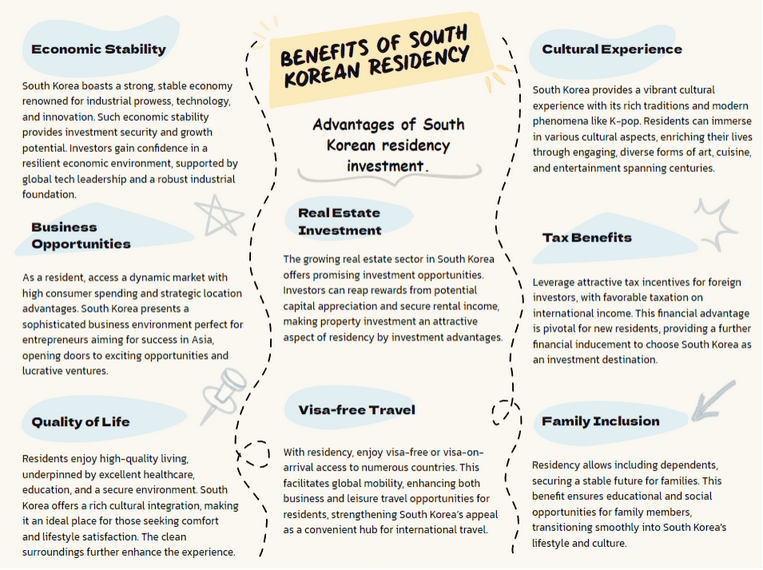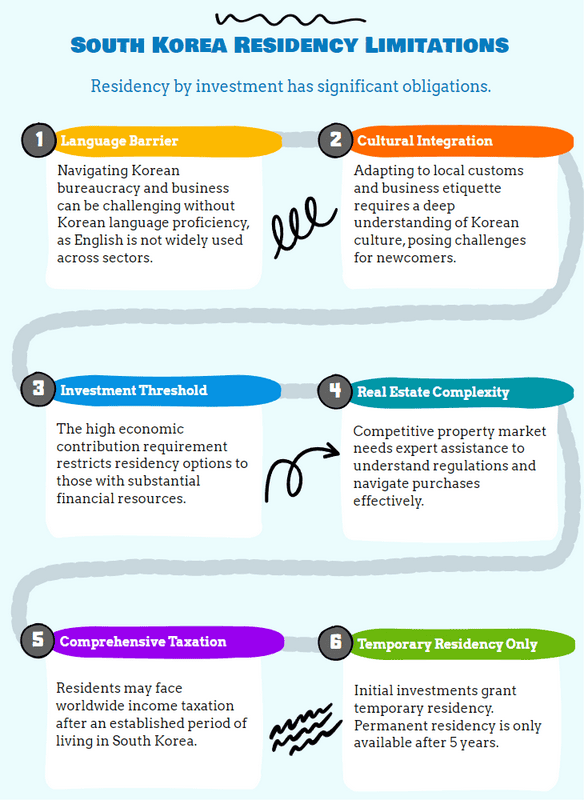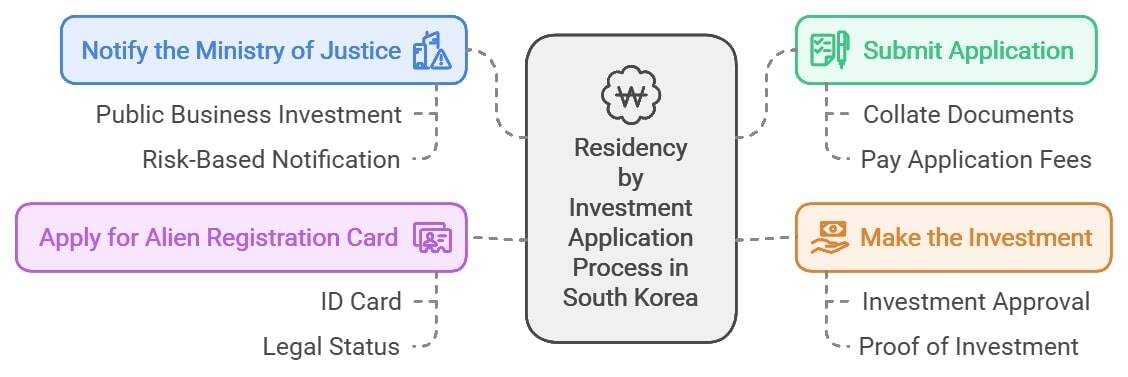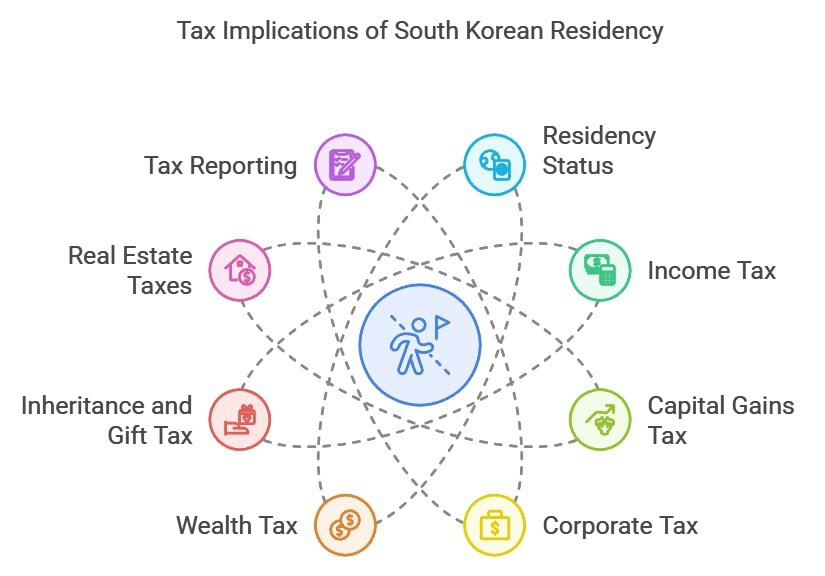South Korea Residency By Investment
Boost Your Freedom Without Compromise.
- Who offers the CHEAPEST program available.
- Who offers the BEST program available.
- What you need to qualify?

- South Korea's residency by investment program, the D-8 visa, targets foreign investors initiating businesses or investing in existing Korean enterprises.
- The investment threshold starts at approximately $100,000 USD, with additional requirements for business plans and potential for job creation.
- Benefits include access to South Korea's robust economy, high standard of living, and strategic location in Asia for business expansion.
- The application involves submitting a detailed business plan, financial statements, and undergoing a review by Korean immigration services.
- While the D-8 visa offers long-term residency, transitioning to permanent residency and citizenship is possible, adhering to specific criteria and demonstrating continuous contribution to the South Korean economy.
South Korea, a nation transformed from war-torn poverty to a high-income OECD member in just a generation, now offers a golden opportunity through the South Korea residency by investment program.
We’ll peel back the layers of this enticing investment option, presenting a concise overview of the program's framework without drowning you in the minutiae.
In This Article, You Will Discover:
Stay tuned for WorldPassports’ distilled guide as we navigate you through the complexities of securing your South Korean residency, where innovation and tradition create a business landscape ripe with potential.
Read on…
*Disclaimer: All amounts quoted in this article were correct and accurate at the time of publication and may have shifted since.
- Who offers the CHEAPEST program available.
- Who offers the BEST program available.
- What you need to qualify?
 Free Consultation
Free Consultation Easy to Use
Easy to Use 100% Safe & Secure
100% Safe & Secure
What Are the Benefits of Residency by Investment in South Korea?
The benefits of residency by investment in South Korea range from the quality of life to its excellent standard of education.

As our expert team sees it, these are the main benefits to consider when assessing South Korea as an investment destination:
- Economic stability: Benefit from South Korea's robust economy, known for its strong industrial base and global leadership in technology and innovation.
- Business opportunities: Gain access to a thriving market with high consumer spending, a sophisticated business environment, and a strategic location as a gateway to Asia.
- Quality of life: Enjoy high living standards with access to excellent healthcare, education, and a clean, safe environment.
- Real estate investment: Take advantage of the growing real estate market, with potential for capital appreciation and rental income.
- Visa-free travel: Acquire visa-free or visa-on-arrival access to numerous countries as a South Korean resident.
- Cultural experience: Immerse yourself in a rich cultural tapestry with deep-rooted traditions alongside cutting-edge cultural phenomena like K-pop and Korean cinema.
- Tax benefits: Leverage potential tax advantages for foreign investors, including favorable tax treatment on international income for new residents.
- Family inclusion: Secure the future for your family with the possibility to include dependents in the residency application.
- Education access: Gain access to world-class education institutions for you and your family, often with opportunities for English-language instruction.
- Healthcare access: Benefit from a top-tier healthcare system known for its advanced medical treatments and facilities.
What Are the Limitations of Residency by Investment in South Korea?
The limitations of residency by investment in South Korea revolve mainly around the obligations that come with it.

Our team has created a definitive summary of the main limitations to consider:
- Language barrier: Navigating bureaucracy and business may be challenging without proficiency in Korean, as English isn’t widely used in all sectors.
- Cultural integration: Adapting to the local customs and business etiquette can be difficult for those unfamiliar with Korean culture.
- Economic contribution requirements: The investment threshold for residency can be high, potentially limiting access to those with substantial financial resources.
- Real estate market complexity: The property market can be competitive and complex, with regulations that may be difficult to understand without expert assistance.
- Taxation: Residents may be subject to comprehensive taxation on worldwide income after a certain period of living in South Korea.
- Temporary residency: Your initial investment rewards you with temporary residency status. You’ll only be eligible for permanent residency after 5 years.
- Residency renewal and permanent residency: There may be stringent requirements for renewing residency permits and obtaining permanent residency, including continued investment and time spent in the country.
- Dependent restrictions: There may be age and relationship restrictions for dependents included in the residency application.
- Mandatory national service: Male dependents may be subject to South Korea's mandatory military service if they become permanent residents.
Which Investment Types Qualify for Residency by Investment in South Korea?
The investment types that qualify for residency by investment in South Korea include business and real estate options.
Here are the finer details:
Public Fund Investment
This route is a guaranteed investment.
The public fund you’ll invest in is administered by the Korea Development Bank.1
Under this investment route, your investment will be repaid to you after 5 years without interest.
Public Business Investment
Under this option, you’ll be investing in a development project in a less developed part of South Korea.
The development project might be in infrastructure, hospitality, or another sector.
This is essentially a risk-based investment route, meaning that the investment will come with certain risks alongside the potential for great returns.
Get this…
The Minister of Justice in South Korea designates less developed areas through consultation with relevant ministries in the country.
Real Estate Investment
Your real estate investment must be in the hospitality sector in a specially designated area.
This means you’ll be investing in hotels, golf resorts, villas, and so forth.
The designated areas for the approved real estate projects include:
- Jeju Special Self-Governing Province
- Pyeongchang Alpensia in Gangwon-do
- Songdo, Yeongjong, and Cheongna in the Incheon Free Economic Zone
- Yeosu and Gyeongdo in Jeollanam-do
- Haeundae and Dongbusan in Busan
What Are the Eligibility Requirements for Residency by Investment in South Korea?
The eligibility requirements for residency by investment in South Korea start with a clean criminal record, proof of tax clearance, and good standing.
Let’s have a look at the other criteria for obtaining residency by investment in South Korea.
Minimum Investment Amount
One of the first eligibility criteria is being able to commit to the minimum investment amount.
Take a look at the investment amounts applicable:
Public Fund Investment
If you choose to invest via the public fund route, the minimum investment amount is KRW500 million (approximately US$382,000).
Your investment amount will be held for 5 years.
Public Business Investment
Should you choose to invest via South Korea’s public business route, the minimum investment amount is also KRW500 million (approximately US$382,000).
An exception applies if you’re older than 55; in this circumstance, the minimum investment amount is KRW300 million.
As with the public fund investment route, your investment amount will be held for 5 years.
Real Estate
If you choose to invest in a real estate project, regardless of your age, the minimum investment amount is KRW1 billion (approximately US$765,000).
Note
All of these routes grant you temporary residency status.
After 5 years (effectively the holding period of your investment), you’ll be eligible for permanent residency.
Language Requirements to Qualify
There are no language requirements to qualify for the temporary residency status that investment confers on investors in South Korea.
However
To qualify for permanent residence status after 5 years, you’ll likely need to prove some proficiency in the Korean language.
Nationalities Restricted from Applying
Officially, South Korea doesn’t bar any qualifying individual from applying for its residency by investment program.
If you can meet the minimum investment requirements and aren’t a tax evader, you’ll be eligible to apply.
Will My Dependents Be Included Under My South Korean Residency by Investment Permit?
Yes, your dependents will be included under your South Korean residency by investment permit.
Specifically, your dependents include your spouse and unmarried children.2
How Long is the South Korean Residency by Investment Permit Valid & Can It Be Extended?
The South Korean residency by investment permit is a temporary residency status and is valid for the duration of your investment holding period.
Here are the specifics:
Validity Period
The temporary residency permit in South Korea is valid for 5 years.
Visa Extension
After 5 years of holding temporary residency status through investment (and maintaining your investment), you’ll be eligible to apply for permanent residency status in South Korea.
What’s the Application Process for Residency by Investment in South Korea?
The application process for residency by investment in South Korea isn’t complex, but it’s worth planning for it to ensure ultimate success.
We have the most up-to-date info for you below.
Step-by-Step Application Process
Our exceptional WorldPassports team has broken the process down into 4 handy steps for you.

Read on.
Step 1: Notify the Ministry of Justice
This step only applies to the Public Business investment option, which is risk-based.
You’ll need to notify the Ministry of Justice in the region in South Korea where the investment will be made.
Step 2: Submit Application
If you’ve completed or necessarily skipped Step 1 and obtained approval from the Ministry of Justice, collate your documents and submit your residency by investment application to South Korea’s Immigration Office.
You’ll also need to pay the application fees at this point.
Step 3: Make the Investment
If your application is approved, South Korea’s Immigration Office will ask you to make your investment.
You’ll need to provide proof of the investment in order to receive your residency permit.
Step 4: Apply for Alien Registration Card
Once your application process is finalized, you’ll register for an Alien Registration Card (ARC).
This serves as an ID card and proof of your legal status in South Korea.
Required Documents
You must submit comprehensive documentary support with your residency by investment application.
Expect to provide the following documentation:
- A clean criminal record
- A tuberculosis test certificate
- Proof of net worth above KRW300 million
- Passport
- Bank statements
- Passport-size photographs
- Proof of good health
- Marriage certificate (if applicable)
- Birth certificates for dependent children (if applicable)
- Education certificates
- Proof of tax compliance
Bear in mind
This list is comprehensive, but not exhaustive.
Depending on your specific circumstances, you may be required to produce further evidentiary support for your application.
What Costs Are Involved in Getting Residency by Investment in South Korea?
The costs involved in getting residency by investment in South Korea include the application fee, legal costs, and more.
Let’s have a look.
Application Costs
The application costs for residency by investment in South Korea typically come to KRW130,000 per applicant.
These application fees pay for the processing of your application.
Legal & Advisory Costs
Investing in South Korea for residency in the country comes with various legal and regulatory implications; as such, you’re likely to run into certain legal and advisory fees.
In our seasoned experience, these are the big ones to plan for:
- Retainer fees: You’ll need to hire an immigration lawyer to navigate South Korea’s residency by investment process. Lawyers may charge a retainer fee upfront.
- Hourly rates or flat fees: Legal professionals may charge either hourly rates for their services or a flat fee that covers the entire residency process.
- Application drafting: The cost of drafting your investment residency application by legal professionals.
- Due diligence: Some lawyers or firms offer due diligence services to ensure that the investment meets the program’s criteria and foresees potential legal issues.
- Immigration consultants: If you use the services of an immigration consultant or advisory firm, they’ll charge fees for their advice and services in finding suitable investment opportunities and assisting with the residency process.
- Financial advisory services: Financial advisors may be needed to guide the investment, including tax implications and the structuring of your investment in South Korea.
Additional Associated Costs
The additional associated costs are often an unnamed aspect of residency by investment planning.
But WorldPassports has you covered.
These are the associated costs we see come up most often:
- Property acquisition taxes: When investing in real estate for residency purposes, expect to pay acquisition taxes. Temporary residents may be eligible for a reduction in these taxes, but they’ll likely still apply.
- Registration taxes: Taxes are also involved in registering the property in your name.
- Translation services: If your documents are in a language other than Korean, you'll need to get them translated by a certified translator.
- Notarization fees: Any official documents submitted for the application will likely need to be notarized.
- Document authentication: There might be costs for the authentication of documents by the relevant authorities (e.g., apostille or consular legalization).
- Travel expenses: These include flights to South Korea for you and your dependents, if necessary, for the application process.
- Accommodation: This entails temporary housing costs while you establish residency or await the completion of your real estate purchase.
- Health insurance: South Korea may require you to show evidence of health insurance.
- Renewal fees: There may be fees associated with renewing your residency permit, if required.
- Permanent residency or citizenship application: Additional costs will be incurred if you opt for permanent residency or citizenship in the future.
What’s the Processing Time for South Korean Residency by Investment?
The processing time for South Korea’s residency by investment application depends upon several factors.
Let’s get specific.
Average Processing Time
On average, residency by investment applications in South Korea take between 6 and 12 months to process.
Usually, the South Korean authorities will invite you to make your investment within 6 months of your application, assuming your paperwork has been approved.
Factors Affecting Processing Time
The factors affecting processing times range from the completeness of your application to factors that are beyond your control.
Typically, these are the factors that most often affect processing times in South Korea:
- Volume of applications: The number of applications received by the immigration authorities can significantly impact processing times. Periods of high volume may lead to delays.
- Completeness and accuracy of the application: Applications that are complete and free of errors can be processed more quickly. Conversely, missing information or discrepancies can lead to additional requests for information and extended processing times.
- Due diligence checks: Thorough background checks are conducted on applicants to ensure they meet the investment program’s requirements. The complexity of an applicant’s background can affect how long these checks take.
- Type of investment: Different investment options may require varying verification and approval processes. For example, real estate purchases might take longer due to the need for property appraisals, inspections, and registration.
- Government efficiency: The efficiency and workload of the South Korean immigration authorities and other governmental departments involved in the processing can affect the timeline.
- Applicant’s nationality: Some nationalities may require more rigorous security checks than others, which can extend processing times.
- Legal representation: The effectiveness of the legal team or consultancy representing an applicant can also impact the processing time. Experienced representatives can navigate the system more efficiently and anticipate potential issues.
Expedited Processing Options
South Korea doesn’t officially offer expedited processing options for its residency by investment applicants.
However
Higher levels of investment or contributions that significantly impact the South Korean economy may be given priority processing in some instances.
How Soon Will I Receive My Residency Permit After My Residency by Investment Application is Approved?
Upon approval of your residency by investment application and receipt of your investment, your temporary residence permit will be granted almost immediately.
It’s then up to you to maintain your investment and apply for permanent residency when the time is right.
What Are the Tax Implications of Residency by Investment in South Korea?
The tax implications of obtaining residency by investment in South Korea can be quite complex, and they may vary depending on the specifics of your situation.

Here's a list summarizing the main points:
- Residency status: Once you become a tax resident in South Korea, you’re typically liable to be taxed on your worldwide income.3 Non-residents are only taxed on their South Korean-sourced income.
- Income tax: Tax residents pay income tax on their global income at progressive rates, from 6% to 45%. Different rates apply for non-residents, who are taxed only on income derived from South Korean sources.
- Capital gains tax: Residents are subject to capital gains tax on worldwide property and investments, whereas non-residents pay this tax only on assets located in South Korea.
- Corporate tax: If your investment involves owning a business in South Korea, the profits of the business will be subject to corporate tax, which is levied at various rates depending on the level of profits.
- Wealth tax: South Korea imposes a comprehensive wealth tax on certain categories of assets if they exceed a particular threshold.
- Inheritance and gift tax: Residents may be subject to inheritance or gift tax on worldwide assets, while non-residents are taxed only on assets located in South Korea.
- Real estate taxes: There are property acquisition taxes, registration taxes, and annual property taxes to consider for real estate investments.
- Tax reporting: Tax residents in South Korea are required to report their global income and file an annual tax return.
- Double taxation agreements: South Korea has double taxation agreements with many countries, which may reduce the tax burden for residents with income from abroad.
- Exit tax: An exit tax system applies to certain high-net-worth individuals upon the loss of their tax residency status in South Korea.
- Tax incentives: Some investment programs may offer tax incentives or exemptions for a certain period or under certain conditions.
Crucial advice
Consult with a tax advisor or accountant who’s knowledgeable about South Korean tax law to understand your potential tax obligations and plan accordingly.
Tax regulations can change, and personal circumstances can significantly affect tax liabilities.
Is Residency by Investment in South Korea a Pathway to South Korean Citizenship?
Yes, residency by investment in South Korea can be a pathway to South Korean citizenship.
If you don’t choose to apply for permanent residency after 5 years of holding your temporary residence permit, you can also apply for citizenship.
Bear in mind
The eligibility criteria for South Korean citizenship are, of necessity, more stringent than those for permanent residence.
Common Questions
What’s the C-4 Visa in South Korea?
What’s the F-6 Visa in South Korea?
What’s the D-8 Visa in South Korea?
Can Foreigners Get Permanent Residency in South Korea?
Does South Korea Allow Foreign Investment?
What Language is Spoken in South Korea?
Is South Korea Safe from North Korea?
What’s the Easiest Way to Immigrate to South Korea?
In Conclusion
South Korea offers a dynamic and welcoming environment for those looking to gain residency through investment.
With its strong economy, advanced technology sector, and rich cultural landscape, South Korea presents an attractive opportunity for investors aiming to relocate.
The various residency by investment options offer clear pathways to establishing a new home in South Korea, regardless of what draws you there—the high standard of living, the vibrant culture, or both.
Navigating the process requires careful consideration, and our WorldPassports team is honored to guide you along the way.
Asian and the South Pacific teem with opportunity; if South Korea seems appealing, have a look at our articles on some of the other residency by investment programs in the region.
Learn More: Asian & South Pacific Residency by Investment Programs
- Who offers the CHEAPEST program available.
- Who offers the BEST program available.
- What you need to qualify?
 Free Consultation
Free Consultation Easy to Use
Easy to Use 100% Safe & Secure
100% Safe & Secure





